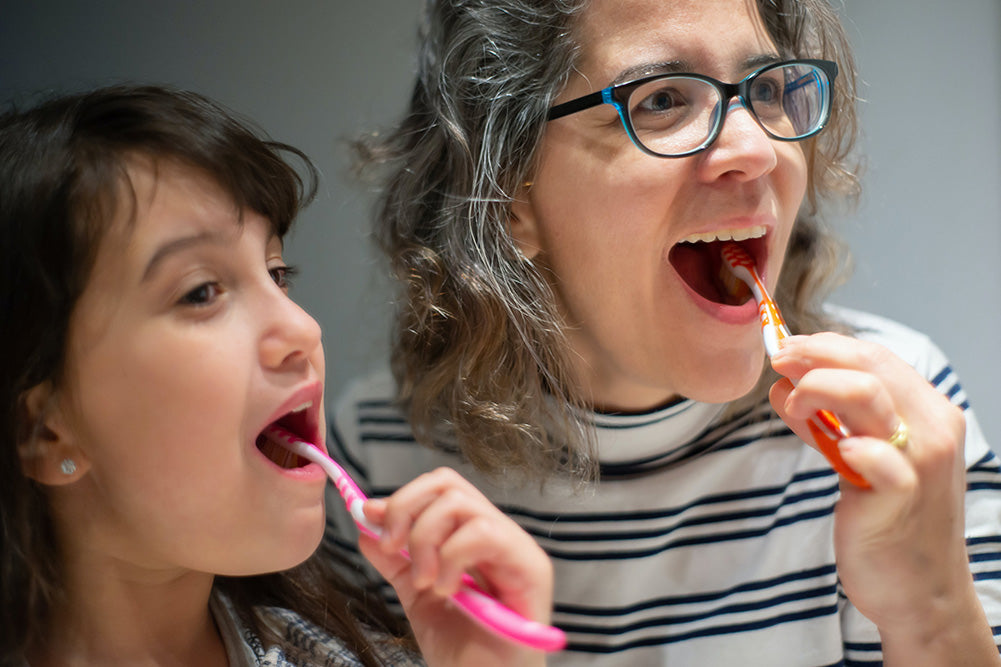Your Cart is Empty
February 08, 2024 3 min read

When many Americans travel to other countries, they take special precautions to avoid drinking the tap water. Many choose to drink and brush their teeth with bottled water, “just to be safe.” However, these precautions are tossed to the wayside when they re-enter U.S. soil. People assume the water here is held to a higher standard than in other countries. This may not be the case, as over 9.2 million lead service pipes are still active in carrying water to households across the United States (1). Do these lead pipes put people at risk of lead poisoning? Can they get sick from brushing their teeth?
Lead is a toxic metal found in the earth’s crust. It is commonly used in manufacturing and household products, but over the past forty years, U.S. regulations cut back on the amount of lead used in gasoline, paint, pipes, and plumbing fixtures (2).
Lead exposure is dangerous to all people, but children are the most at risk, since children tend to be more tactile and touch their mouths or eyes without washing their hands. They can be exposed to lead paint on a wall or lead flakes from a pipe and never know they are inhaling or ingesting it. Children exposed to lead are at risk of a lower IQ, anemia, and slowed growth (3). Adults exposed to lead by breathing or ingesting it can suffer from reproductive problems, hypertension, and problems with their heart or kidney (4).
Before 1986, most homes had lead plumbing, so older homes almost certainly have contaminated tap water. However, even as recently as 2014, pipes were still allowed to contain 8% lead. Regulations have tightened up since then, but still “lead-free” pipes contain 0.25% lead (5).
As water winds through the pipes over time, the process of corrosion occurs. Corrosion is when the pipe wears down based on a chemical reaction between water and the plumbing, and little pieces of lead pipe enter the water (4). These tiny pieces of lead are what contaminate the water, and from there they have the potential to contaminate you if ingested.
The CDC states that it is not safe to brush your teeth with tap water unless there is a filter on it (6). If no water filter is available, it is suggested to brush your teeth with bottled water. Tap water potentially containing lead should not be used to brush your teeth or rinse your mouth. Similarly, tap water is not recommended for cooking, either.
While brushing your teeth with tap water is not recommended, bathing in tap water is still perfectly safe (assuming you do not swallow the bath water). Lead cannot be absorbed through the skin, so there is no real risk to bathing with lead-contaminated water (5).
If there is a concern about brushing your teeth with lead-contaminated water, there is an easy solution. A water filter tested to remove contaminants inorganic contaminants like lead will be the easiest, most cost-effective way to remove lead from your water (7). Running your tap water through a water filter will make it once again safe to drink and brush your teeth with.
Lead is a toxic metal that is more than likely in your household’s plumbing. Pipes containing lead corrode over time, allowing lead to enter the water. This water is not only unsafe to drink, but it is dangerous to brush your teeth with, as well. To avoid the health risks that come with lead poisoning, try an independently lab-tested water filter, like those offered through Seychelle. A Seychelle water pitcher is tested to remove up to 99.99% of inorganic contaminants, including lead. With Seychelle, you can rest assured knowing your water is safe for all your personal hygiene needs.
Can you brush your teeth with water containing lead?
No. The CDC recommends that your tap water be filtered before using it to brush your teeth.
Is it OK to drink water with lead in it?
No. Lead is a toxic metal that can lead to a slew of health risks.
Is it OK to bathe in water with lead?
Yes. Lead cannot be absorbed through the skin, so it is safe to bathe or shower in water containing lead.
What to do if your water tests positive for lead?
If your water tests positive for lead, the quickest option for removing it is investing in a water filter that can remove contaminants like lead.
References